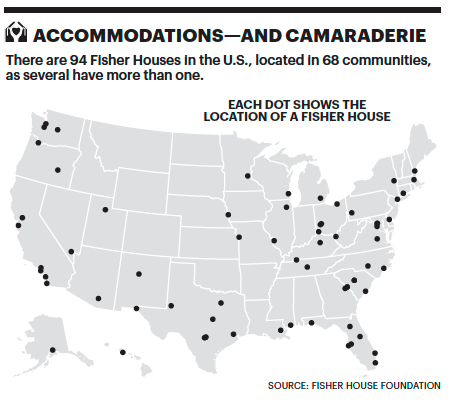AARP Hearing Center

When Vietnam veteran James Hayes was diagnosed with throat cancer in the summer of 2023, he and his wife, Lucille, dreaded a potential 140-mile round trip to the cancer center where the U.S. Department of Veterans Affairs was covering his treatment.
But then a social worker helped arrange for them to stay at the Fisher House in Columbia for the entirety of his radiation treatment. It was 29 treatments, on 29 days.
“I would have had to come back and forth from the big city of Barnwell,” he says, noting his hometown south of Columbia.

But at the Fisher House, he says, “It was just as if we were home.” The staff even threw a party for the couple’s anniversary and James’ birthday, both of which occurred during their stay.
For more than 30 years, nonprofit Fisher Houses across the country have hosted veteran or military families with a family member receiving medical treatment at nearby hospitals — all for no charge.
The house in Columbia, opened in April 2023, is South Carolina’s second, joining a similar house in Charleston. Houses offer private bed-and-bath suites, amenities such as laundry, and space to relax and socialize.
And in the eyes of guests and staff, they’re a vital force for healing.
“Caregiving is a long road,” says Joseph M. Meyers Jr., associate state director for outreach and veterans for AARP South Carolina. “We want folks to know that the house is here.”
Shared meals, camaraderie
For Jim Weiskopf, nights at the Fisher House came after long days at a hospital in Charleston, where his wife was being treated. “The price of admission to a Fisher House,” he says, “is service in the U.S. armed forces.”
For Weiskopf, now 80, that meant the Vietnam War, followed by a career as a U.S. Army officer. He also was an executive and consultant for the Fisher House organization for more than two decades, until 2020.
But Weiskopf says the free bunk is just part of the benefit of staying at a Fisher House. The camaraderie extended by other guests is an unexpected bonus.
Weiskopf says Fisher House guests come with things in common. There are the medical challenges. And then there is shared military experience. “ ‘What branch of service were you in? When did you serve?’ ” he says. That, he notes, helps create an automatic bond, regardless of the medical situation.
The South Carolina houses each have 16 bed-and-bath suites. Staff managers coordinate with hospital social workers — especially emergency room staff — to open the door to a Fisher House for caregivers and families who realize only after their loved one is admitted that they also need a place to stay.
Once the relationship is established, families make arrangements directly with the house. Houses are intended for veterans, service members, caregivers and families who live 50 or more miles away from the hospital.
Even when a house is full, the manager might have resources to arrange a complimentary stay at a nearby hotel, says Michelle Horn, a spokeswoman for the Fisher House Foundation.
Fisher House hospitality in South Carolina is partly courtesy of local nonprofits that provide financial and practical support. Funds raised support food, personal items for guests, programs and special projects, Horn says. AARP South Carolina has been a consistent supporter of the Fisher House in Columbia, giving it $55,000 in donations since 2018.
In Columbia, Fisher House manager Candler Rhodes is cultivating relationships with local businesses, clubs and service groups that want to pitch in to make the house a home. “Whatever you would need at your house, we need it here, times 16,” Rhodes says.
For the second half of the year, Rhodes plans to have local volunteers organize holiday-themed activities like cookie decorating — a way to help guests missing their family traditions, she says.
You can find more information at fisherhouse.org.
Joanne Cleaver, a North Carolina– based journalist, covers business, personal finance and other issues.
More on Veterans
- AARP Veterans Resources
- How to Navigate VA Health Care Benefits
- How to Get Caregiving Help From the VA































































